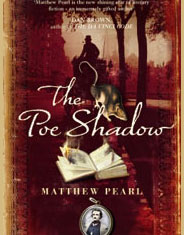The Dark Death of Poe
By Matthew Pearl | 13 Feb 2009
The Poe Shadow
Matthew Pearl
2006
Random House, New York
371 pages
From every depth of good and ill
The mystery which binds me still…
-- Edgar Allen Poe, ‘Alone’
 To the avid reader of mysteries, a thriller that lingers in the twilight zone of the literary and the historical is an exciting prospect. Matthew Pearl’s second bestseller, The Poe Shadow masters this technique skilfully enough to keep the readers turning pages quickly till the end.
To the avid reader of mysteries, a thriller that lingers in the twilight zone of the literary and the historical is an exciting prospect. Matthew Pearl’s second bestseller, The Poe Shadow masters this technique skilfully enough to keep the readers turning pages quickly till the end.
Edgar Poe, or Edgar Allen Poe as he came to be known died in Baltimore in 1849 with few to mourn over his death. Poet and writer of the darkest and most radical pieces, he was hardly a social favourite and his death unleashed a moral tirade against his life and writings. Convinced that Poe’s death is not as uncomplicated as it seems, a young lawyer and an ardent fan, Quentin Clark sets out to uncover the truth about it.
Matthew Pearl’s artful first person narration beautifully recreates the nineteenth century; the social conditions and the mindset of the period. The protagonist Quentin Clark’s narrative displays an ideal balance between involvement in the events of his time and a critical attitude that makes the age more accessible and interesting to the contemporary reader. A brilliant example of Pearl’s critical and humourous description of the nineteenth century is his comment on Paris. Clark, in pursuit of someone who can tell him something more about Poe’s life and death, finds himself in Paris. After he has been interrogated by the police he says:
"It was explained to me at a later time that the watchful eye of the Parisian police fell on any American entering their city along who was a young man—especially an unmarried young man—as potential “radicals” who had arrived with intent to overthrow the government. Considering that the government had been overthrown quite recently, when King Louis-Philippe was replaced three years earlier by a popular republican government, this imminent fear of radicalism seemed mysterious to one not so well versed in the politics of France. Did they worry that the mobs, having gotten their legislature and duly elected president, and now bored of republicanism, would be instigated to riot to have their kings back again?"
Pearl skilfully weaves into the story a vivid description of the expectations of appropriate behaviour in high society and the treatment of blacks and the condition of women. Though he does not stop to make a pointed comment about any of these issues, the narrative itself gets us thinking about some of these things.
The Poe Shadow is written in the style of a murder mystery but till the end of the first half of the book, the sleuth Quentin does not convince the readers of his competence. Not only is he not able to excite the characters in the novel about Poe’s death but the reader too cannot help wondering what it is that is bothering Clark so much. The reader may in fact identify more with Peter and Hattie (as I did), who tell Clark to get on with his life. His introspections and thoughtful pondering gets a bit tedious and the novel could do with a little work in that area.
This groundwork however makes the second half an exciting read as Quentin discovers the truths not only about Poe but about himself. In that sense, The Poe Shadow is different from any other mystery.
Matthew Pearl's well researched book succeeds as an entertaining mystery, a historical novel and a treatise on Poe’s strange death.


















